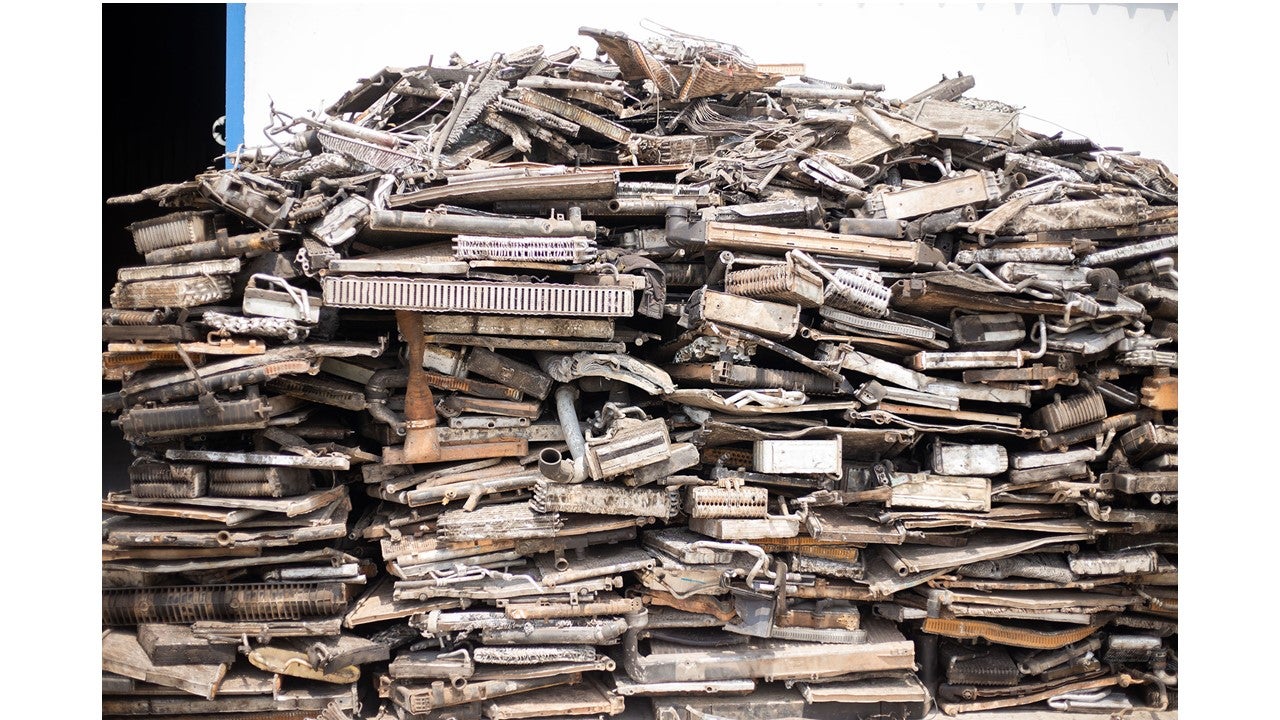How Raymond Onovwigun aims to become the king of recycling
‘I saw all these cranes and grabbers and weighbridges and I thought – this is for me,’ Raymond Onovwigun, founder of Romco Metals, tells Andy Martin


He was supposed to be studying economics at Roehampton University. But he was inspired to drop out and take a plumbing course after watching Charlie Mullins on television. And that was before Raymond Onovwigun stepped off the plane in Nigeria and came up with the idea that would become Romco Metals.
He had to be a little economical with the truth to his mum in Clapham, too. Growing up, he used to help her clean houses. She was a great traditionalist and had urged him to go to university and become a lawyer or a doctor. “How are your studies going, Raymond?” she would ask. “Fine, Mum!” he would reply, omitting the fact that he was now plumbing the mysteries of taps and pipes. Being 6’ 7” tall, he realised that he was never going to be a natural at cramming himself under sinks, and concentrated instead on building up the business and recruiting a lot of shorter men to do the work. “I was good at the sharp intake of breath when you’re inspecting a job – it’s the first thing they teach you.”
His mother noticed that, considering he was a student, her son seemed to be getting a lot of calls early in the morning. Finally he confessed that he had switched to plumbing and heating, and revealed that the business already had a turnover of over a million. She asked, “Is there a degree in it?” He said he’d do it for a few years then go back to college. “She still thinks I will,” he says, laughing.
The reality is that Roehampton’s loss is Africa’s gain. Onovwigun was born in London, but he’d been to visit relatives in Nigeria a couple of times growing up. He knew that, as he puts it, “it’s not all red noses and charity.” He saw it more as a land of growth and opportunity. Then, in 2014, aged 24, he flew to Lagos for the first time. As he was driving out of the airport he saw a pile of scrap cars at the side of the road. When he went back again a couple of weeks later, the cars were still there. Onovwigun made up his mind to do something about it.
You realise how much you’re impacting on people’s lives. It’s a big responsibility
His plumbing company had already expanded to include waste collection and recycling. “I saw all these cranes and grabbers and weighbridges and I thought – this is for me.” But the industry in the UK seemed to him to be fairly saturated. Nigeria was another story. A nation of 205 million people. “The opportunity was right there in front of my eyes,” says Onovwigun. “Abandoned cars. And scrap waste in general. Africa has nearly one-fifth of the world’s population. But we were only doing 1 per cent of the world’s metal recycling.”
He got a start in early 2015, storing waste metal on land rented from his aunt at the back of her petrol station, in a shed he built himself. Then he found a “baler” – a machine that compresses metal – on the pages of AutoTrader. After baling, the metal is taken to furnaces to be rendered into ingots or rolled into flat sheets. “We have some of the biggest landfills in the world,” he says. “It’s a waste of waste!”
There are only 60 metal recycling facilities in the whole of Africa, compared to 250 in Europe. Onovwigun felt he was effectively pioneering the recycling business in Nigeria. “But Lagos can make or break you,” he says. “It’s not all highs – there were a lot of lows. I underestimated how much was involved.” He was also unlucky enough to contract both malaria and typhoid. When he was well again, he went back to London in search of more investment. Several hundred languages are spoken in Nigeria, “but the common language is money,” says Onovwigun.
Now Romco has four furnaces in Nigeria and another one in Ghana, and Onovwigun reckons they’re on track to have revenues of £40m by the end of this year. In the space of a few short years he has gone from one-man band to employing 180 people in Nigeria, 50 in Ghana, and another 15 in the UK. “You realise how much you’re impacting on people’s lives. It’s a big responsibility.” They have powered through the pandemic. “I’ve spent a lot of time in quarantine,” says Onovwigun. “I’ve definitely paid my dues.”

Within the next five years they expect to process 725,000 cubic metres of waste – the equivalent of 100 football fields covered in rusty cars and cans (or, if you prefer, one football field – but piled 100 metres high). “We are turning trash into treasure,” says Onovwigun. “For us, it’s all about getting sustainable materials into the market. But being green doesn’t mean you can’t be profitable too. This is not greenwashing – it’s real.” Recycled aluminium, their biggest single material, uses 95 per cent less power and saves 95 per cent on emissions by comparison with raw, mined aluminium.
Romco has spent £2.5m on building a network of new businesses in the region. “We are creating new entrepreneurs,” says Onovwigun. And they are expanding, aiming to install plants across Africa and beyond. “Our aim is to be global. We want to be the kings of recycling.” Perhaps there is potential here for a new television reality show, “Britain’s Richest Recycler”.
Join our commenting forum
Join thought-provoking conversations, follow other Independent readers and see their replies
Comments
Bookmark popover
Removed from bookmarks